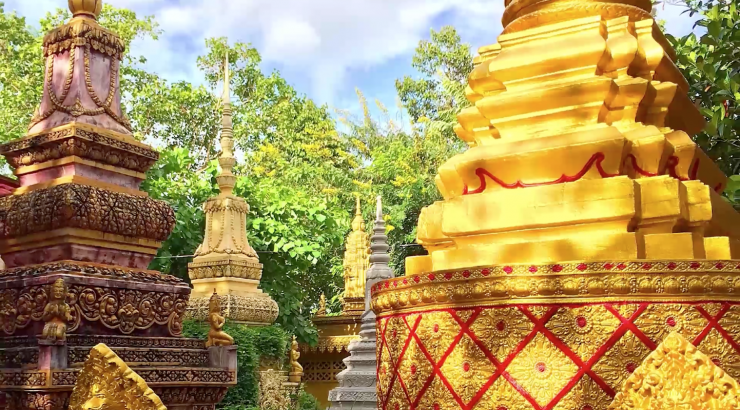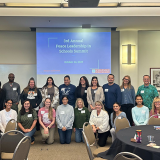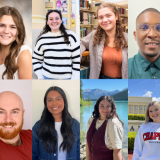Counseling, school psychology students trek to Southeast Asia for conference, volunteer work
June 10, 2015
Last summer, 26 students from the graduate programs in counseling and school psychology at Chapman University traveled to Vietnam and Cambodia with faculty members to participate in ongoing short-term study abroad programs.
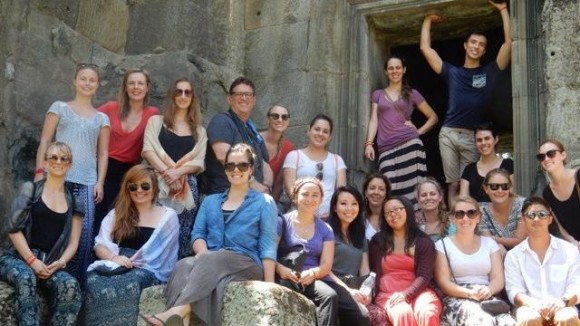
Students in Cambodia
In Cambodia, the Chapman delegation performed volunteer work at Grace House, a nongovernmental organization that provides educational services to children from three small villages near Siem Reap. While there, the students and faculty distributed over 4,000 school supplies, as well as play equipment.
Traveling onward to neighboring Vietnam, the Chapman delegation attended and presented at the Fourth Conference on School Psychology. The event in Hanoi brought together psychologists, researchers, educators, councilors, educational administrators and social workers to discuss the topics of developing training programs and managing quality assistance for training and services in school psychology in Vietnam.
“One of the aspects that drew me to graduate work at Chapman was the opportunity to look at school psychology through the lens of cultures different from my own and with a group of people who were likeminded in waiting to develop a deeper understanding of and respect for different cultures,” said Amanda Schlitt, an Irvine native and second-year student in Chapman’s school psychology program.
“I took the trip to Cambodia and Vietnam as a way to take myself out of my own comfort zone – to check my privilege at the airport gate – and learn from a culture completely different from my own, “ she said.
Chapman University’s College of Educational Studies has maintained a relationship with universities in Vietnam since 2009. Cambodia was added to the Southeast Asia trip in 2012 and again last year.
“While our work in Vietnam has been focused on higher education and working with faculty members and having student exchanges, our work in Cambodia has been on working directly with young children and building capacity among teachers and staff at the NGCs we have worked with,” said Michael Hass, a CES professor and coordinator of the graduate program in school psychology.
Schlitt says the trip provided and incredible opportunity to interact with students in both countries and learn about a rich culture she knew nothing about. She was blessed by Buddhist monks, explored ancient temples and discovered local customs, food and languages.
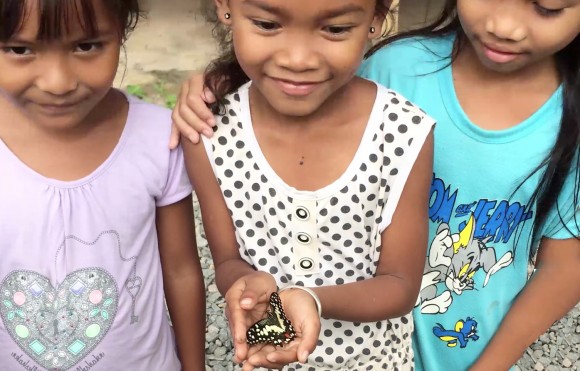 “I learned that people, and children especially, are resilient, that learning can and will happen even in the face of lacking resources, that the teachers there do awesome and hard work, like our teachers here in the states,” says Schlitt. “I’m eternally grateful for my time there, for the people, I met who influenced my approach as a school psychologist, and I would go back in a heartbeat, despite the insane humidity.”
“I learned that people, and children especially, are resilient, that learning can and will happen even in the face of lacking resources, that the teachers there do awesome and hard work, like our teachers here in the states,” says Schlitt. “I’m eternally grateful for my time there, for the people, I met who influenced my approach as a school psychologist, and I would go back in a heartbeat, despite the insane humidity.”
“My experience in Cambodia was very enlightening and eye-opening,” says Sherry Huang, who graduated from Chapman in May with masters and education specialist degrees.
While in Asia, Huang developed lessons and taught English to a group of students age 8 through 10. “Most of our lessons consisted of fun activities and games to promote English language development through social interactions,” she said. “In return, the students taught me a lot about the power of resiliency and the importance of tailoring education to accommodate their reality.”
“It’s clear from our experience with the students who have traveled with us that they have taken a step closer to being global citizens,” Hass said.
The two countries were chosen in part because Long Beach is home to the largest Cambodian population outside of Cambodia and Orange County is home to the largest Vietnamese population outside of Vietnam, Hass said.
“These experiences have a direct impact on our students’ future work in schools in Southern California,” he said.
